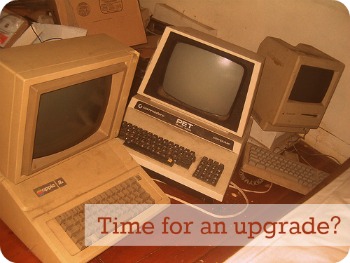 MICHAEL WEISKIRCH
MICHAEL WEISKIRCH
HR Technology Specialist
Almost 60% of companies plan to make a major new HR technology purchase in less than two years, according to a recent Forbes article. This being the case, there's a good chance this big-ticket item has been kicking around your company. [This webinar on developing a self-service culture using HR technology could be good food for thought; it starts at 10 a.m. CDT Sept. 10.]
Here are seven signs that it may be time to get serious about an HR technology upgrade:
1.) HR is stretched thin and needs help
Today, a human resources department is managing many components outside employee benefits. For instance, there's payroll (which obviously is incredibly important to employees), and HR is responsible for reporting required by the Affordable Care Act. There's probably not enough staff to complete onsite enrollment. You get the picture.
2.) Your employees don't understand the benefits message that's being delivered
The medium is the message, and if your current HR technology system isn't user friendly, your benefits message is falling short. Why is it important to communicate benefits? Studies show that just communicating benefits — without changing any benefit content — increases employee satisfaction 70%. Don't let underperforming HR technology stand in the way of employee satisfaction.
3.) The culture of your firm is ready for new HR technology
Is your firm using cloud-based technology, such as Salesforce.com, Dropbox, or Google Drive? If the cloud already is part of your work culture, an HR technology upgrade to a cloud-based solution might not be as painful as you think! Be wary of HR technology firms that don't talk about customization for your company's culture and instead fall back on their industry experience. Just because they've worked with firms like your firm doesn't mean they know about your unique culture. It takes more than knowledge about an HR technology product to promise it will work with your culture.
4.) Your HR management system is old
Experts hold that enterprise software is shot after seven years. This being the case, now can you better understand why your company is getting the seven-year itch? Your expiration date could be approaching.
5.) Your company has too many HR technology systems
There's one for time sheets, another for training, and still another for vacation. Employees (and likely HR staffers) are hungry for a streamlined, consumer-driven solution. Depending on your firm, it could be time to investigate single-vendor options. At the very least, you're frustrated by learning various user interfaces and dashboards — and re-explaining them ad nauseam.
6.) You want to do something with your people data
The information HR collects on talent is filled with undiscovered insights — patterns, causal relationships, etc. Your old system may make discovery difficult. The correct suite of HR technology might allow you to better leverage findings about your people and recruitment efforts.
7.) Your CEO has ID'd human capital as a challenge
A global survey of CEOs found that human capital was the top challenge for 2013, followed by operational excellence and innovation (which also are driven by human capital and concerns over how to help employees do their best work). HR technology may help your firm address this challenge by improving employee engagement and talent acquisition.
Any decision you make about HR technology will be driven by your unique workforce. A better management system could be yours to discover.
Related Posts:
5 Ways You Can Improve the HR Technology Experience
Health Care Reform Deadline for All Employers is October 1
5 Best Practices for Onboarding [Onboarding 101: The Series]
Understanding Health Care Reform: 4 Steps for Talking to Employees
.png?width=69&height=53&name=Acrisure%20Logo%20(White%20Horizontal).png)

![[ GET THE SLIDE DECK ] Doing More with Less: Developing a Self-Service Culture Using HR Technology](https://no-cache.hubspot.com/cta/default/38664/f2e2722d-0cb0-4c77-a560-76bc9edfc909.png)
